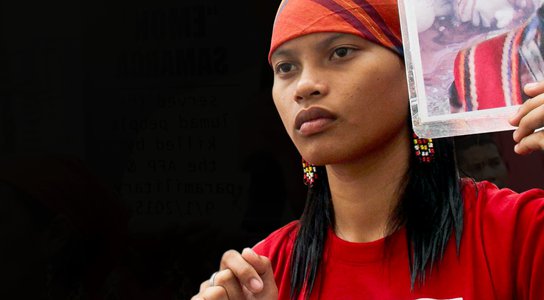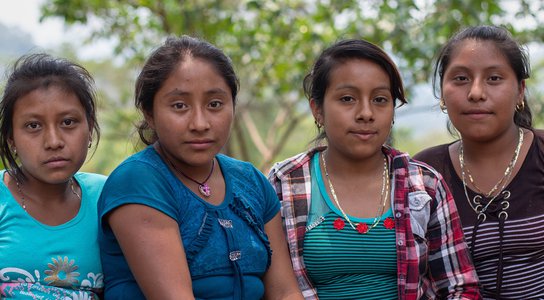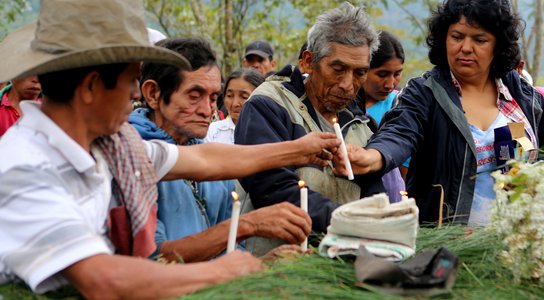150 environmental defenders murdered there since the 2012 Olympics
This year’s Olympic host Brazil is the world’s most dangerous country to take a stand against environmental destruction, with 150 environmental defenders murdered since the 2012 games. New data from Brazilian NGO CPT reveals how 23 activists have already been killed this year for defending their land, forests and rivers, with most deaths linked to logging and agribusiness. (1)
At a press briefing in Rio de Janeiro on Thursday, indigenous leaders from the Amazon will talk about the killings, attacks and threats they face defending their forests against illegal logging and the expansion of cattle ranches and agriculture like soy, palm oil and eucalyptus.
“For many visitors to the Rio Olympics, Brazil is synonymous with its vast, plentiful rainforests and traditional ways of life. Yet the people who are trying to protect those things are being killed off at an unprecedented rate,” said Global Witness campaigner Billy Kyte. “Recent years have seen a weakening of Brazilian laws aimed at safeguarding environment and human rights, with fatal consequences.”
Brazil is at the sharp end of a rising global trend in violence and intimidation. Last month Global Witness revealed how at least 185 environmental defenders were killed across continents in 2015 - by far the highest annual death toll on record.
Brazil’s Amazon is a major locus of violence. After almost a decade of decline, deforestation rates are on the rise again, with a 16% increase last year – the result of watered down forest laws, a powerful agricultural lobby, and the economic downturn, which is driving more people to illegally log timber and clear land for crops.
“Without the forest there wouldn’t be food for us, there wouldn’t be water… So our life depends on keeping the forest standing. That's why we have made it our life’s mission to protect the forest,” said Osmar Ka’apor, an indigenous leader from Brazil’s Maranhão state, interviewed by Global Witness in June.
In the absence of state support, the Ka’apor tribe has decided to crack down on the illegal logging that is ravaging their forests. Armed with bows, arrows, GPS trackers and camera traps, they patrol their forests, blocking off logging tracks and confiscating timber. This has come at a high cost. Four members of the Ka’apor have been murdered since 2009, allegedly by illegal loggers. The community continues to receive regular death threats.
Some of the countries competing in the Rio Olympics are raising the stakes by buying Brazilian timber, an estimated 80% of which is illegal. Most of this ends up in the US, Europe, China and Japan. (2)
Brazil is also the world’s second biggest exporter of soy, an industry presided over by agricultural minister Blairo Maggi, whose appointment in May dealt a huge blow to hopes for environmental reform. Nicknamed the ‘soy king’ Maggi is one of the richest men in Brazil thanks to his family business – the world's largest soybean producer.
Maggi is currently supporting a constitutional amendment called PEC 65 that, if approved by Congress, will bring an end to environmental and indigenous protection laws for large-scale infrastructure projects – a move backed by Brazil’s powerful farming lobby.
Meanwhile, less than three months into office, Brazil’s interim President Michel Temer has already folded the Human Rights Ministry, effectively freezing implementation of the country’s already weak protection programme for human rights defenders.
“It has never been more urgent to protect Brazil’s rainforests and the people who defend them, yet the country’s new leaders are actively dismantling laws and institutions designed to do just that,” said Sonia Guajajara, national coordinator for Brazil's Association of Indigenous Peoples, which was represented by leaders of three of its member organizations at the briefing in Rio on Thursday. “We are calling on the government to strengthen its national protection programme for activists under threat, and for Congress to prevent constitutional amendment PEC 65 from being passed into law. Without these provisions we risk seeing yet more murders on Brazil’s environmental frontiers.”
/ Ends
For interviews, briefings in English and Spanish and other information please contact:
Billy
Kyte +44 (0)7703 671308 [email protected]
Ben
Leather +44 (0)7841 337034 [email protected]
Alice
Harrison +44 (0)7841 338792 [email protected]
For photographs, video interviews and B-roll of Brazil’s environmental
defenders see:
Notes to editors:
(1) 2016 data from the Brazilian NGO Comissão Pastoral da Terra (Pastoral
Land Commission).
(2) Chatham House (October 2014), Illegal Logging
and Related Trade The Response in Brazil. Available from:https://www.chathamhouse.org/sites/files/chathamhouse/field/field_document/
/ ENDS
You might also like
-
Report On Dangerous Ground
2015 was the worst year on record for killings of land and environmental defenders – people struggling to protect their land, forests and rivers
-
Campaign Land and environmental defenders
Land and environmental defenders play a crucial role in protecting their land - and our climate - against destructive business practices.
-
Report How Many More?
New report shows killings of environmental activists are increasing, with indigenous communities hardest hit.